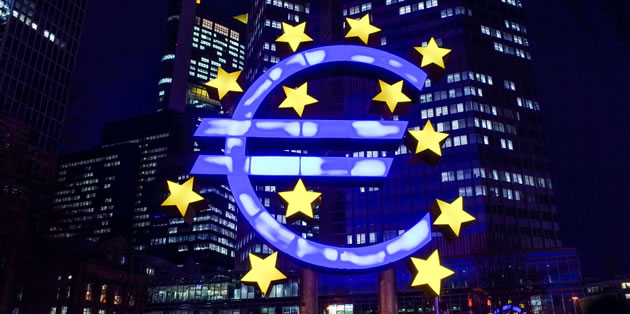Australian Dollar Extends Lead Over the Euro
The Australian Dollar has extended its lead against the Euro to over 1%. A -2.3% fall in house prices in Sydney during the final quarter of 2015 has suggested that the Reserve Bank of Australia’s (RBA) recent measures to curb property prices have been successful and are steering Australia away from a property bubble.
Australian Dollar Bullish as Chinese Stock Route Reinforces Stimulus Need
The Australian Dollar is currently performing well against the Euro, despite another drop in the Chinese stock market. While the Shanghai Composite Index has closed -6.4% down, the Australia ASX All Ordinaries Index rose 1.7%. This is likely down to the fact that a continued fall in Chinese stocks puts more pressure on Beijing to further stimulate the economy.
Yesterday…
European Stocks Close in the Red as Oil Rally Falters
European stock markets ended the day in the red after a tantalising rise caused by a short rebound in oil prices, with Brent and WTI crude both reaching towards US$33. Prices have since slumped back below US$31, taking stocks with them. The UK FTSE 100, the German DAX and the French CAC have closed down -0.7%.
The Euro is making bullish advances today as another speech from Mario Draghi nears, while the Australian Dollar is soft on weakening demand from China.
Earlier…
Mario Draghi Speech Could Boost EUR/AUD if Additional Stimulus Measures are Suggested
A strong performance for the Euro today comes courtesy of an impending speech by European Central Bank (ECB) President Mario Draghi, due to take place later in Frankfurt. The common currency is advancing 0.5% on Pound Sterling (GBP), 0.7% on the New Zealand Dollar (NZD) and Indian Rupee (INR), 0.8% on the Australian Dollar and 0.9% on the Canadian Dollar (CAD).
The advance comes amid market anticipation of more ECB stimulus measures. Draghi previously hinted that additional action would be taken in the March meeting of the Governing Council, stating that the council ‘will review and therefore possibly reconsider our monetary policy stance at our next meeting in March.’ RBS economists had previously predicted further easing wouldn’t happen until June.
Draghi’s two main options are a further cut to the already negative deposit rate, taking it further below the current level of -0.3%, or an extension of the current asset purchasing programme from €60 billion per month. The total quantitative easing target currently stands at €1.5 trillion after the deadline was extended from September 2016 to March 2017 at the December policy meeting.
The ECB are acting to try and boost the Eurozone’s sluggish rate of inflation, which is well below the target level of just under 2%. In December the ECB forecast inflation would rise from the 0.2% level to hit 1% this year and increase again in 2017. However, with oil prices 40% lower than they were at the time the forecasts were made, the chances of those figures being accurate are highly unlikely.
The Euro to Australian Dollar (EUR/AUD) exchange rate is currently trading in the region of 1.5509.
Australian Dollar to Euro (AUD/EUR) Plummets as Australia Seeks Stronger Trade Relations with the Middle East
Faced with a continuing slowdown in demand from China, the Australian government is currently focussing on the Middle East as a potential source of new trade relationships. Senator Richard Colbeck, Australian Minister for Tourism and International Education, as well as an assistant to the Minister of Trade, is currently visiting the Middle East as part of an annual trade campaign. After 24 consecutive years of economic growth, driven partly by a booming demand in resources from overseas, the Australian economy is facing building fears of a recession. Australia’s economic growth forecast has been cut by 25 basis points to 2.5% for 2015-16 after the services sector, which accounts for 70% of the economy and a higher percentage of employment, contracted in final quarter of 2015.
Bilateral trade between Australia and the Middle East is currently worth A$16 billion, compared to the country’s A$213 billion relationship with China. Australia secured a Free Trade Agreement (FTA) with China, South Korea and Japan in 2014 and is hoping to do the same with the Gulf Cooperation Council (GCC), after the member states froze negotiations in 2009.
The Australian Dollar to Euro (AUD/EUR) exchange rate is currently trading between 0.6433 and 0.6501.
Euro to Australian Dollar (EUR/AUD) Exchange Rate Forecast: Busy Australian Data Day on Wednesday
Wednesday’s Australasian session sees the release of the Australian Consumer Price Index which is predicted to show a 0.1% increase in inflation to 1.6%. The Eurozone German GfK Consumer Confidence Survey is due out during the European session.
The Euro to Australian Dollar (EUR/AUD) exchange rate is currently trending between 1.5372 and 1.5542.



